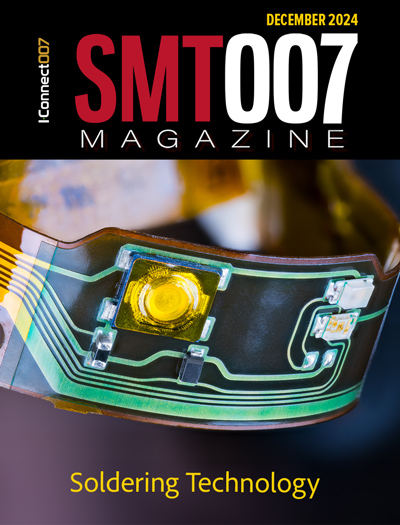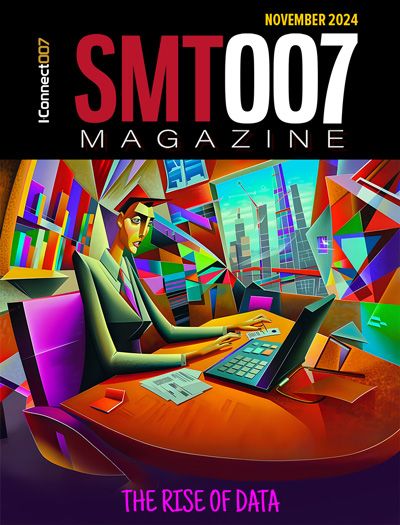-

- News
- Books
Featured Books
- smt007 Magazine
Latest Issues
Current Issue
The Path Ahead
What are you paying the most attention to as we enter 2025? Find out what we learned when we asked that question. Join us as we explore five main themes in the new year.

Soldering Technologies
Soldering is the heartbeat of assembly, and new developments are taking place to match the rest of the innovation in electronics. There are tried-and-true technologies for soldering. But new challenges in packaging, materials, and sustainability may be putting this key step in flux.

The Rise of Data
Analytics is a given in this industry, but the threshold is changing. If you think you're too small to invest in analytics, you may need to reconsider. So how do you do analytics better? What are the new tools, and how do you get started?
- Articles
- Columns
Search Console
- Links
- Media kit
||| MENU - smt007 Magazine
IPC Issues Clarion Call for EU to Reclaim Leadership in Electronics Manufacturing
November 21, 2024 | IPCEstimated reading time: 2 minutes
IPC released a synopsis of its recent white paper, Securing the European Union’s Electronics Ecosystem. This condensed document presents a comprehensive overview of the current challenges in Europe’s electronics manufacturing industry and shares actionable steps to help the EU achieve a stronger, more autonomous ecosystem. The synopsis document is designed as an informative tool for policymakers, media, and other key stakeholders outside the industry, reinforcing IPC’s commitment to supporting Europe’s path to technological sovereignty.
IPC’s efforts in Europe, led by Alison James, senior director of IPC’s European government relations, stress a commitment to building a strong European electronics industry. The focus of this work is on promoting policies that support Europe’s strategic autonomy and competitiveness, especially within the context of the European Competitiveness Deal and the Chips Act. “Collaboration between industry and policymakers is needed to address gaps in the electronics manufacturing supply chain. The synopsis complements IPC Europe’s ongoing work by clearly outlining these areas and advocating for urgent support to ensure that the EU’s ambitions extend beyond semiconductor production,” said James.
The synopsis serves as a foundation for policy discussions by providing specific industry insights, helping decision-makers understand the real-world impact of these supply chain gaps. For example, Europe’s aerospace and defense industries are strong globally but still rely on non-EU sources for critical components. Similarly, the telecommunications and healthcare industries show high demand for electronics yet face vulnerabilities due to limited regional production capacity for key components.
By clearly illustrating these gaps, the synopsis strengthens the case for a comprehensive strategy. This also emphasizes the need for a complete European electronics ecosystem. One example of this is how the EU has set ambitious semiconductor targets under the €43 billion Chips Act, but the synopsis argues that semiconductor production alone will not secure Europe’s supply chain. A truly self-sufficient ecosystem requires additional focus on PCBs and advanced packaging, two areas where Europe currently depends on imports, creating risks of supply disruptions and delays.
IPC’s electronics manufacuring call to action was included at the end of the synopsis, and it urges EU policymakers to establish an electronics manufacturing strategy within the European Competitiveness Deal and to enact a Strategic Electronics Manufacturing Act. Such initiatives would encourage investment, foster innovation, and create a skilled workforce, each of which are elements that are essential to securing Europe’s position as a global leader in electronics.
Added James, “By advocating for targeted interventions and strategic partnerships, IPC’s efforts aim to encourage European policymakers to take action that will help meet the region’s critical technology needs independently, sustainably, and competitively. The synopsis is both a tool for advancing this agenda and an invitation for stakeholders to join IPC in driving the EU’s electronics manufacturing renaissance.”
Suggested Items
PCB Market Expanding at 3.62% CAGR, To Reach $100 Billion by 2032
01/17/2025 | EINPresswire.comThe global Printed Circuit Board (PCB) Market was valued at US$72.63 billion in 2023 and is projected to exhibit steady growth over the coming years.
See You in Vienna: Speaker Spotlight on PEDC
01/16/2025 | I-Connect007 Editorial TeamVienna, Austria, is known for its amazing architecture, art museums, and classical music scene. But from now on, Vienna might also be known for its PCB design conference. IPC and FED have partnered to create a new PCB design conference in there. The Pan-European Electronics Design Conference (PEDC) takes place Jan. 29-30, 2025 at the NH Danube City hotel in Vienna.
DuPont Reaffirms Guidance, Accelerates Electronics Spin-off
01/16/2025 | PRNewswireDuPont announced the acceleration of the separation of its Electronics business and is now targeting November 1, 2025 to complete the transaction.
TRI to Join SMTA Austin Expo 2025
01/16/2025 | TRITest Research, Inc. (TRI), the leading provider of test and inspection systems for the electronics manufacturing industry, is pleased to announce plans to exhibit at the SMTA Austin Expo 2025, scheduled to take place on February 6, 2025, at the Travis County Exposition Center.
TopLine’s Martin Hart to Present at Microelectronics Reliability and Qualification Workshop (MRQW)
01/16/2025 | TopLine CorporationTopLine Corporation’s Founder and CEO Martin Hart has been invited to deliver a presentation on the topic of how “Braided Solder Columns reduce mechanical stress in large heterogeneous 2.5D advanced packages for space and commercial applications” at The Aerospace Corporation’s Microelectronics Reliability and Qualification Workshop (MRQW) in Los Angeles (El Segundo), California on February 12, 2025.


